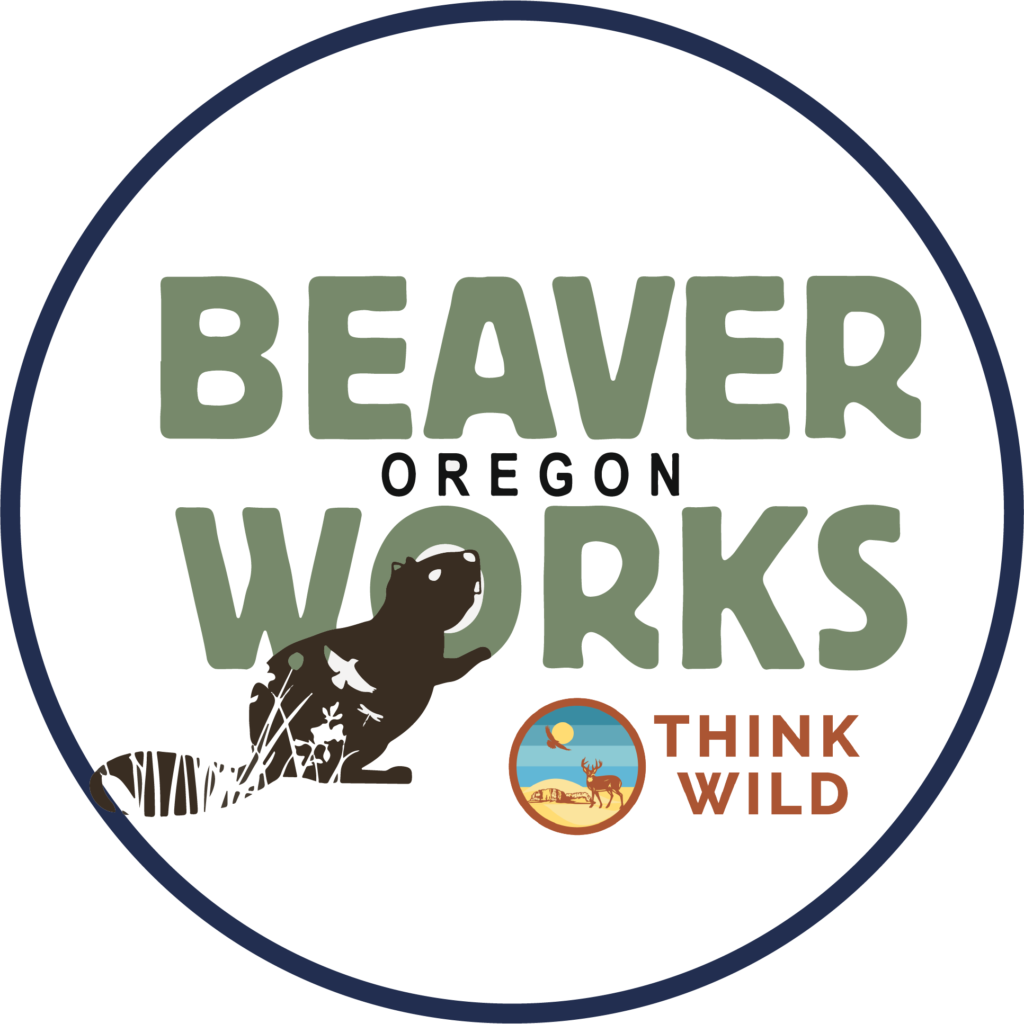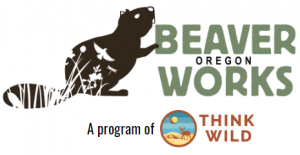News: Beaver Works Oregon

Prineville Event Highlights How Beavers Aid Ranching
News Release – August 27, 2021
For Immediate Release
Note to the press: Photos and video are available at: https://beaverworks.org/bdas-beavers-and-bonanza-on-an-idaho-ranch/ Please credit Beaver Works Oregon unless otherwise noted.
Bend, Oregon — “BDAs, Beavers and Bonanza on an Idaho Ranch” is coming to Prineville, Oregon, on September 14th, 2021. The live presentation features speaker Jay Wilde, who will share the story of the remarkable stream restoration on his ranch in Southern Idaho. The event is presented by Beaver Works Oregon, a program of Think Wild, and the Crooked River Watershed Council.
The presentation will explore stream restoration related to beavers to restore watersheds, the latest restoration methods used during periods of drought, water dynamics when beavers are present, and how to control beavers around infrastructure. Attendees will also learn about the current state of the Crook River watershed and how to develop projects on their lands.
Speaker Jay Wilde grew up in Birch Creek, Idaho. His childhood was filled with memories of swimming and fishing in the stream that ran through the family ranch. By the time he took over operations in 1995, he found that the stream was running dry by the middle of July. He came to realize this was partly due to the practice of trapping and removing beavers.
Beaver activity helps regulate stream flows through dams and channels that spread water laterally, while cooling water underground that slow releases later in the season. Deep pools created by beavers also enrich habitat for fish and other wildlife. Through the work of native beavers and the use of man-made structures that mimic or reinforce beaver dams, known as Beaver Dam Analogues (BDAs), watersheds can be restored.
Chris Gannon, Council Coordinator for the Crook River Watershed Council, says, “The council believes bringing beavers back to their former and appropriate habitats increases the overall amount of water retained in the watershed, raises groundwater levels in areas associated with beaver ponds, and makes for a more resilient landscape. Using tools such as Beaver Dam Analogs (BDAs) to encourage beavers to set up a permanent presence may be necessary to create suitable conditions and bridge the time gap until they become established.”
“BDAs, Beavers and Bonanza on an Idaho Ranch” will be held at 6 pm at the Crook County High School (Performing Arts) in Prineville. Doors will be opening at 5:30 pm. Light snacks and beverages will be provided.
For questions, please contact the beaver solutions hotline, (541) 362-1024. Think Wild (Beaver Works Oregon) is a 501(c)(3) nonprofit organization, and tax-deductible donations can be made at https://beaverworks.org/donate/ or mailed to PO Box 5093 Bend, OR 97708.
###
Beaver Works’ mission is to support beaver and native wildlife habitat on Oregon high desert landscapes in three different focus areas: Support, Habitat, and Education. Beaver Works is a program of Think Wild, a 501(c)(3) nonprofit and a licensed, insured member of the National Wildlife Control Operators Association.
Think Wild’s Beaver Works Oregon Program Launches “River Neighbors” Initiative
Features Trail Camera Loans, Photo Contest, & Guided Walks
Bend, Ore. (September 3, 2020) — Beaver Works Oregon, a program of Think Wild, invites people who live and play along the Deschutes River to get to know beavers as shapers of wildlife habitat and protectors of precious water in a dry land. To launch its “River Neighbors” initiative, the group will offer a trail camera loan program, a wildlife photo contest, and guided river walks at the Old Mill District of Bend.
“Living on one river, we are linked to one another,” said Reese Mercer, program director of Beaver Works Oregon. “Our new River Neighbors initiative invites people to share perspectives, find common currents, and learn about the ecology of the Deschutes River.”
While River Neighbors focuses specifically on more than 800 residents living along the Deschutes between La Pine and Redmond, the new initiative has a larger goal of reaching the greater neighborhood of all who spend time on the river.
Gail Snyder, executive director of Coalition for the Deschutes, welcomes River Neighbors as another way to bring people together for the common good of a shared Deschutes. “To be good neighbors of the river,” she said, “we need more ways to meet each other, to share challenges, to give back in acts of reciprocity, and to celebrate the one river that connects us all.”
River Wildlife Photo Contest: Charge up your digital cameras, smart phones, or auto trail cameras to enter and share your best photo or short video recording taken from your property if you are a river neighbor resident, or along the public lands by the Deschutes. The contest runs through October 15. Prizes awarded via a raffle include a gift certificate to WinterCreek Restoration and Nursery and one of our favorite trail cameras.
Trail Camera Loan Program: Residents along the Deschutes River can reserve infrared trail cameras to enjoy riverine wildlife activity, from beavers to otters and mink. The video cameras record what animals are doing while people are away or sleeping. They provide vital insights to animal patterns and behaviors that in turn can inform ways people and wildlife can live harmoniously on the river.
Guided River Walks: Join a small group for socially-distanced walks along the Deschutes River to learn of the wildlife along this riverscape and the benefits of beaver in our riparian ecosystems. The first monthly hour-long walk will be held Sunday, September 22nd at 8am. Registeration – for free – at the Beaver Works website is required.
To learn more about River Neighbors, the photo contest, the trail camera loan program and upcoming River Walks visit the website https://www.beaverworks.org/riverneighbors.
# # #
Beaver Works’ mission is to support beaver and native wildlife habitat on Oregon high desert landscapes in three different focus areas: Support, Habitat and Education. Beaver Works is a program of Think Wild, a 501(c)(3) nonprofit and a licensed, insured member of the National Wildlife Control Operators Association.
Think Wild Announces New Beaver Response Team Serving Central Oregon
Service mitigates beaver impacts to public and private land while preserving keystone species
Bend, Ore. (June 19, 2020) — Think Wild, Central Oregon’s new wildlife hospital and conservation center, is excited to announce the launch of its “Beaver Response Team.” The response team is an integral part of Think Wild’s program Beaver Works Oregon, which works to build awareness of beaver as a keystone species, enhance habitat and mitigate beaver conflicts.
Every spring and summer, homeowners in Central Oregon — especially those living along a river or stream — may experience fallen trees, property flooding or culvert blockages. This is thanks to the hard work of a large, tree-gnawing, aquatic rodent — the beaver. While tree chewing and dam building may disrupt one’s carefully landscaped yard or pose a risk to a nearby structure, these activities are actually critical to maintaining Central Oregon’s watershed health and create essential habitat for native wildlife.
The Beaver Response Team helps homeowners mitigate beaver damage through proven tools and techniques such as exclusion fencing, sand paint, flexible flow devices and culvert protective fencing. People experiencing beaver conflicts — whether on private or public land — can call the Beaver Response Team, and within 24 hours, field technicians trained in beaver mitigation solutions will provide an initial free consultation. Further resources and support are also available to include on-site assessments and field implementation services, for a nominal fee on a sliding scale.
Beaver are valuable to Oregon’s high desert watersheds. Environmental economists estimate that ecosystem benefits of improved water quality, water availability, vegetation and even flood control amount to $120,000 per beaver. Oregon native wildlife (and many endangered species, including the Oregon Spotted Frog, Redband Trout and Sage Grouse) rely on the favorable habitat conditions created by beavers. By educating individual landowners and land stewards on these benefits and providing viable, alternative solutions to lethal removal, Think Wild hopes the program will help both humans and wildlife alike to coexist and even thrive.
To learn more, visit www.beaverworks.org or contact the Beaver Response Team (541-362-1024) for a free 30-minute phone consultation.
# # #
Beaver Works’ mission is to support beaver and native wildlife habitat on Oregon high desert landscapes in four different focus areas: Education, Support, Habitat and Policy. Beaver Works is a program of Think Wild, a 501(c)(3) nonprofit and a licensed, insured member of the National Wildlife Control Operators Association.

